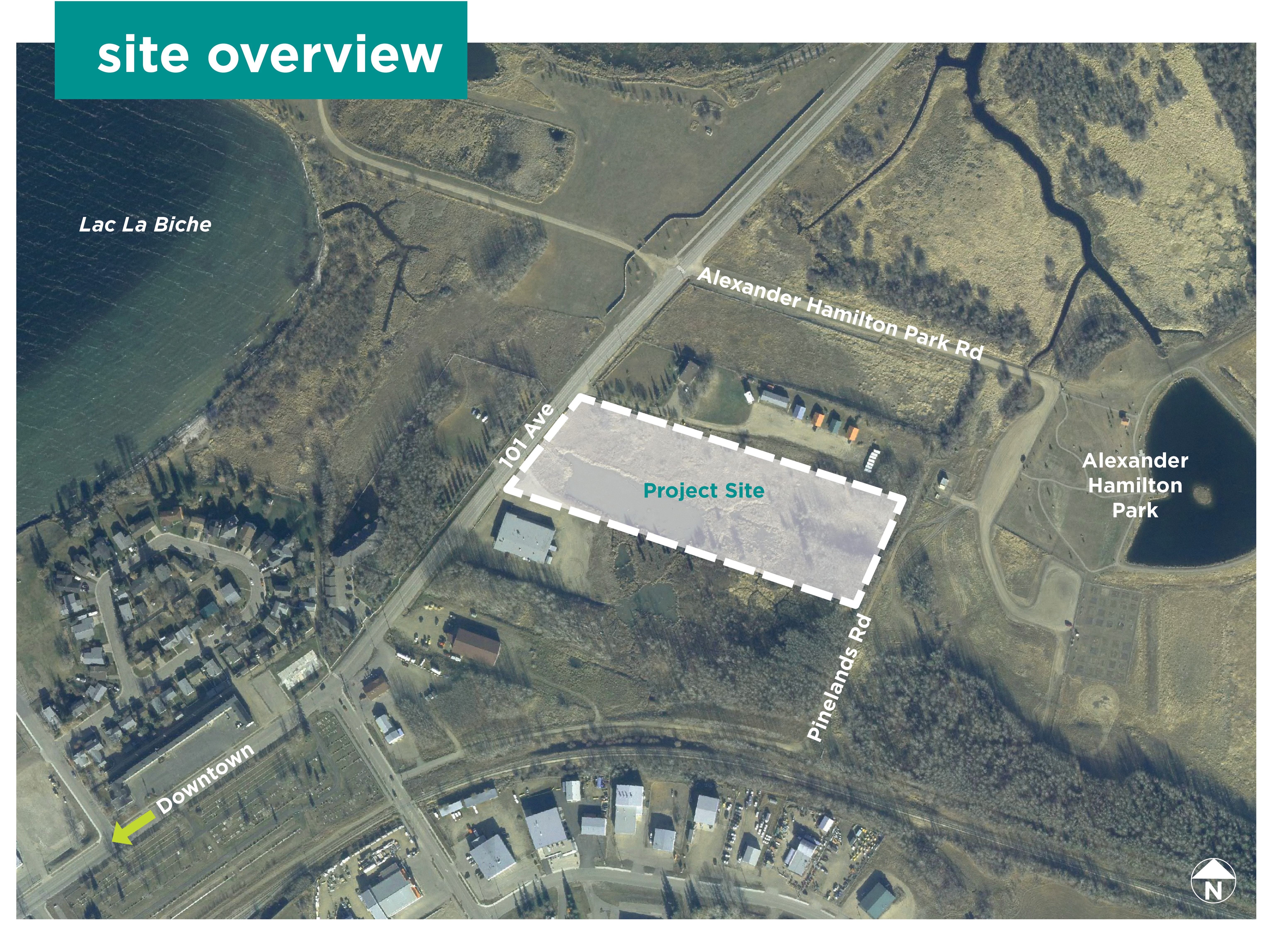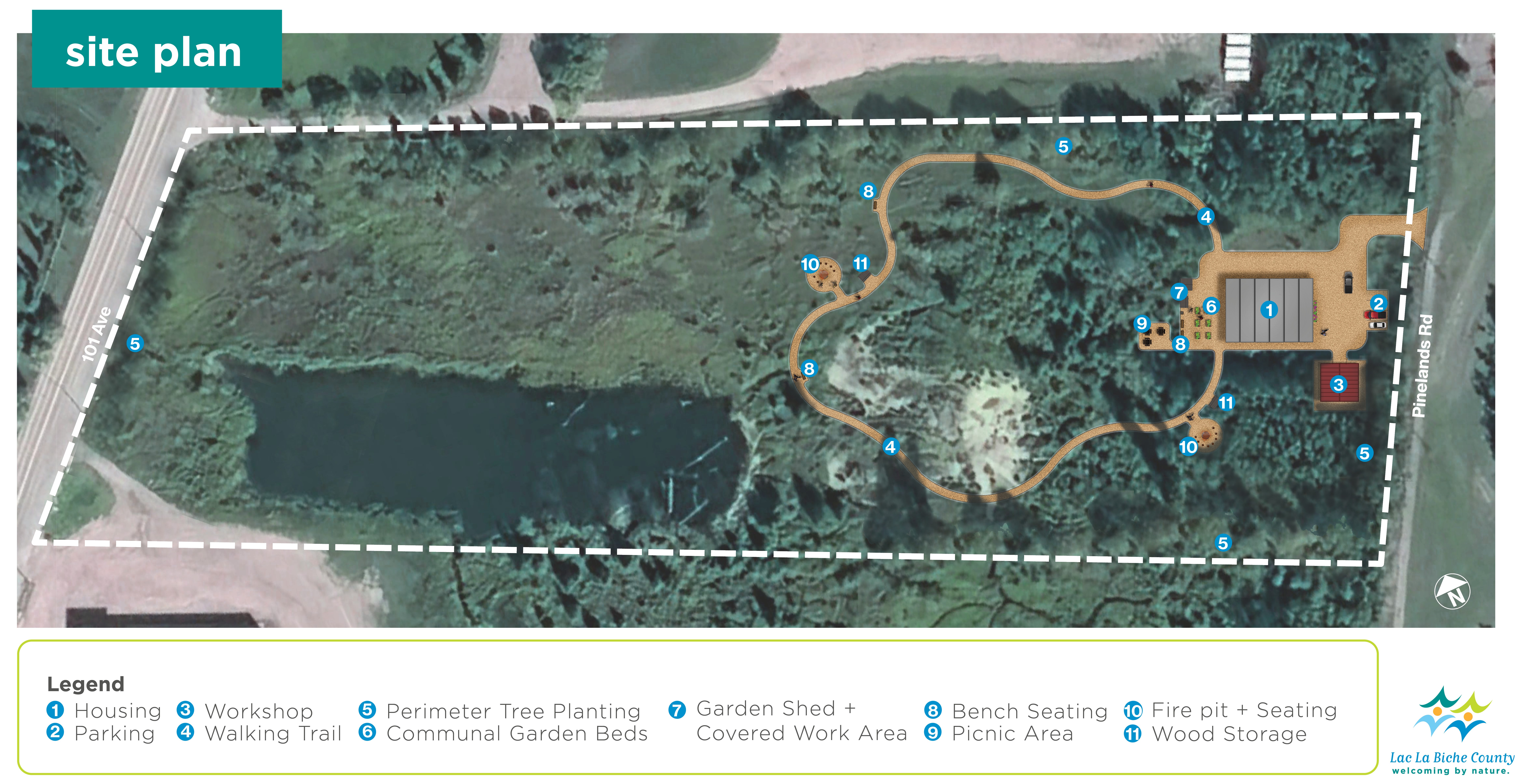Project Overview
The Transitional Housing Project aims to reduce homelessness in Lac La Biche County, supporting Council's goal of promoting social wellness and building a healthy and connected community. The County is providing support to establish a facility to host a 4-stage program to help people transition out of homelessness to independence.
The Transitional Housing Project is funded by $500,000 from Lac La Biche County and a $150,000 federal grant through the Rural Development Network.
Responsibility for operation of this facility is with the Lakeland Out of the Elements Shelter Society. The Society is an experienced non-profit group who have been running facilities in Lac La Biche County for years. They have been courteous and considerate neighbours in the areas which they've operated.
Project Process
- Public Review
- Site Design
- Final Council Approval
- Construction and Implementation
- Site Completion and Public Opening (we are here - site is now operating as a Transitional Housing Facility)
Site Overview and Site Plan
9015 - 101 Avenue (near Alexander Hamilton Park) is the Transitional Housing Project site.


The 4 Stage Program
Once completed, the Transitional Housing Project will offer a 4 stage program to help our homeless population break the cycle and find stable housing.
- Entering the Program
- Individuals enter the emergency mat program (an intox room is available if needed).
- Facility staff members build relationships with individuals entering the program.
- Staff members encourage clients to participate in the maintenance of the facility.
- Through conversations and joint work efforts, staff seek opportunities to develop a personal plan that moves a client into stage 2.
- Providing Supports
- Clients attend detoxification or rehabilitation facilities if required.
- If other issues are present (i.e. mental health), the staff will assist the client in accessing appropriate supports.
- If clients need a place to stay until they can get into facilities to support their change, staff will move them out of the mat program.
- Clients continue to contribute to facility or grounds upkeep, participating in regular activities of the facilities.
- Building Life Skills
- Clients returning from a rehabilitation program will move into stage 3. In this stage, staff work with clients to foster life skills by:
- following a regular schedule of work/activities;
- continue meeting with support providers; and
- learning financial management skills.
- Clients returning from a rehabilitation program will move into stage 3. In this stage, staff work with clients to foster life skills by:
- Transitioning out of Homelessness
- Clients will be assisted with entering market rental accommodations, including finding affordable rental space and frequent check-ins (which will diminish over time).
- Clients will always be welcome to request further supports if they are unsure of their capacity to continue in the changed lifestyle.
Frequently Asked Questions
What is transitional housing?
Transitional housing is a supportive living facility, with services readily available to support people as they try to make changes in their lives. These changes may include addressing addictions, mental health challenges, or learning to live in a stable housing situation.
Who lives in transitional housing?
People who have unstable lifestyles, without stable housing. These people may need to learn or relearn how to live in a regular housing situation, such as establishing healthy routines or caring for a home.
How are residents selected?
While any homeless person or person without accommodation for a night can access the mat program, people moving to the second or third stage of the program demonstrate commitment to follow through with changed behaviours.
What engagement has been done to date?
There was a community engagement process in the spring of 2022 in which the public was invited to have conversations about homelessness, what it looks like, and how it can be addressed. Research work on the 4 stage program and recommendations were provided by the Transitional Housing Task Force. The Task Force included representation from several community agencies and Lac La Biche County.
Are there other communities who have completed transitional housing?
Yes, other communities who have successfully established similar programs include Prince George and Duncan, BC.
Who are the partners that have developed this project?
The eight community partners included Alberta Health, Alberta Works, Hope Haven, the Lac La Biche Canadian Native Friendship Centre, the Lakeland Out of the Elements Shelter Society, Metis Nation Region 1, Portage College, and two private individuals. There was also representation from Lac La Biche County, including staff from our Family & Community Support Services and Protective Services departments.
Questions?
If you have any questions or comments about the project, please email anita.polturak@laclabichecounty.com or call 780-623-6819.
Facebook